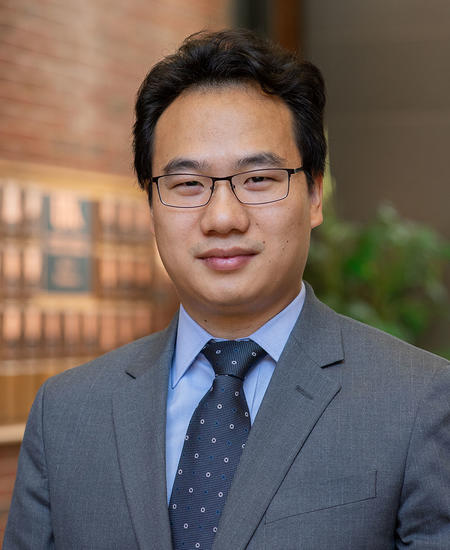Caigang Zhu, an assistant professor in the F. Joseph Halcomb III, M.D. Department of Biomedical Engineering, has been awarded a Research Project Grant (R01) from the National Institutes of Health (NIH). The R01 grant, “Point-of-care Optical Spectroscopy Platform and Novel Ratio-metric Algorithms for Rapid and Systematic Functional Characterization of Biological Models in Vivo," will receive $2,067,823 over five years, ending in July 2028.
The R01 grant is the original and historically oldest grant mechanism used by NIH. It provides support for health-related research and development based on the mission of the NIH. The R01 grant is designed to support a discrete, specified, circumscribed project to be performed by the named investigator(s) in an area representing the investigator's specific interest and competencies.
Zhu's Spectroscopic Imaging Laboratory develops novel optical metabolic spectroscopy and imaging tools for cancer research. Started in Fall 2019, the lab's central focus is creating optical imaging tools for biomedical applications related to tumor metabolism, hypoxia and angiogenesis. Zhu's research group has also studied computer simulation of light transport in tissue, cancer therapies prediction and evaluation and cancer metabolism pathway reprogramming.
Project Summary:
Cellular metabolism is highly dynamic and strongly influenced by its local vascular microenvironment, gaining a systems-level view of tumor metabolism and vasculature in vivo is essential in understanding many critical cancer biology questions. However, there are surprisingly few techniques available that can quantify the key metabolic and vascular endpoints together in vivo in real-time with easy access. The goal here is to fill this gap by developing a point-of-care optical spectroscopy platform with a tumor-sensitive fiber probe and novel data processing techniques to quantify the major axes of tumor metabolism (glucose uptake, mitochondrial membrane potential, Bodipy) and the associated vasculature (oxygenation, hemoglobin) on biological models in vivo in near real-time. For scientific validation and translational research purposes, we will compare our optical platform against well-established metabolic assays. We will then demonstrate the technology through addressing a contemporary problem in cancer therapy for head and neck squamous cell cancer (HNSCC). Specifically, we will address the critical challenge of radio-resistance (RR) in HNSCC and test the hypothesis that radiotherapy (RT) induced HIF-1α and HIF-2α activation and the following metabolic changes are responsible for HNSCC RR and recurrence, the tumor-specific genetic editing platform targeting on HIF-1α and HIF-2α can improve RT efficacy. Our point-of-care optical spectroscopy provides new ways of studying cancer biology and diseases, and it will also impact the study of a wide array of other biomedical problems through the lens of tumor bioenergetics and vasculature. Our study on HNSCC RR mechanisms and the demonstration of tumor-specific genetic editing platform in orthotropic HNSCC models will offer new ways for targeted RT to improve HNSCC patient survival rates. The platforms and methodologies developed in this project will be applicable to the study of RR and recurrence in other types of human cancers.
To achieve these goals, Zhu is supported by a team of engineers, scientists and clinicians including:
- Associate Professor of Biomedical Engineering Sheng Tong
- Professor of Toxicology and Cancer Biology Whei-Mei Teresa Fan
- Dr. Susanne Arnold, associate director of clinical translation and Buck-Kentucky Lung Cancer Research Chair, Markey Cancer Center
- Professor of Biostatistics Chi Wang, associate director of Biostatistics and Bioinformatics Shared Resource Facility, Markey Cancer Center
*Research reported in this publication was supported by the National Institute of Dental and Craniofacial Research of the National Institutes of Health under Award Number R01DE031998, and by the National Institute of General Medical Sciences of the National Institutes of Health under Award Number P20GM121327. The content is solely the responsibility of the authors and does not necessarily represent the official views of the National Institutes of Health.
